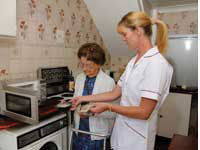
Training standards of home care workers is under the microscope.
The Care Quality Commission said today it will be investigating standards of home care in England, while last week health secretary Andrew Lansley announced plans to develop a code of conduct and minimum training standards for adult social care workers.
Here is home care provider the Good Care Group’s approach to training care workers.
The care sector in England is regulated by the Care Quality Commission (CQC) and their standards of care are covered in the compliance guide, ‘Essential standards of quality and safety’.
The guidance requires that all care staff receive ‘appropriate training’ and undergo a full induction before beginning work.
Regulations state that new care staff must be clearly briefed on the objectives of the care organisation for which they will be working and on the services it provides.
Induction should cover information on policies and procedures, with attention being paid to health and safety requirements, actions in the event of an emergency and various reporting requirements.
The inductee should also be given information on the needs and legal rights of people who receive care from the organisation. Currently, elderly care providers are only required to deliver statutory modules of training as part of an induction programme – such as Moving and Handling, Safeguarding and Food Hygiene. These courses give workers in the sector useful core skills, but they only represent a minimum standard.
However these minimum standards of training are being surpassed by forward-thinking organisations in the sector, who have developed training programmes that provide their staff with greater skill levels in order to provide high quality care.
They are providing their staff with the knowledge and skills to be excellent carers, to enable them to play a fundamental role in enhancing the physical and mental wellbeing of the people in their care.
There are two underpinning requirements for excellence in training carers.
Firstly, training expertise is vital. Most care providers can benefit from a partnership with a recommended training company that uses a variety of methods and trainers passionate about their subject. Careful selection and on-going monitoring of quality is important to ensure that the training partner shares and promulgates the values of the care provider.
Secondly, a rigorous selection process will screen out would-be carers who lack motivation to pursue on-going training and professional development. Many potential carers will not have traditional educational backgrounds.
However, help can be given to improve key skills and develop them professionally. Motivation of staff can be fostered by performance related pay scales linked to CPD and residential training in pleasant venues.
Ideally any induction programme should take place over a number of weeks allowing carers to reflect on and learn from their experiences in the workplace.
The best carer training will incorporate days in a training room, and on-going coaching and mentoring, making use of communications technology where appropriate for cost-effectiveness.
Cultural training is vital, since today’s multi-cultural Britain means that carers may often encounter clients from different cultures. At induction carers should receive training on specific conditions.
An obvious example in the case of elderly people is dementia. To cite only one statistic, dementia currently affects 750,000 people in the UK.
Training carers to recognise and be aware of ways to assist a person experiencing dementia is therefore vital.
Training and updating in such areas should be a feature of the continuous professional development of carers throughout their careers.
Nine months into their work with a quality organisation, the carer is ready to be enrolled on an apprenticeship programme.
This government-funded initiative encompasses the QCF Diploma in Health and Social Care and also numeracy and literacy testing, employment rights and responsibilities and an underpinning technical certificate.
CQC require all carers to be working towards the QCF Diploma. All this represents a well-rounded educational pathway that will professionalise carers and benefit those being cared for.
As well as the funding available for apprenticeships some funding may be available via the Workforce Development Fund.
What do you think?Join the debate on CareSpace
Keep up to date with the latest developments in social care. Sign up to our daily and weekly emails


 ‘Dear Sajid Javid: please end the inappropriate detention of autistic people and those with learning disabilities’
‘Dear Sajid Javid: please end the inappropriate detention of autistic people and those with learning disabilities’ Ofsted calls for power to scrutinise children’s home groups
Ofsted calls for power to scrutinise children’s home groups Seven in eight commissioners paying below ‘minimum rate for home care’
Seven in eight commissioners paying below ‘minimum rate for home care’ Children and young people with SEND are ‘valued and prioritised’ in Wiltshire, find inspectors
Children and young people with SEND are ‘valued and prioritised’ in Wiltshire, find inspectors 
 Facebook
Facebook X
X LinkedIn
LinkedIn Instagram
Instagram
Comments are closed.